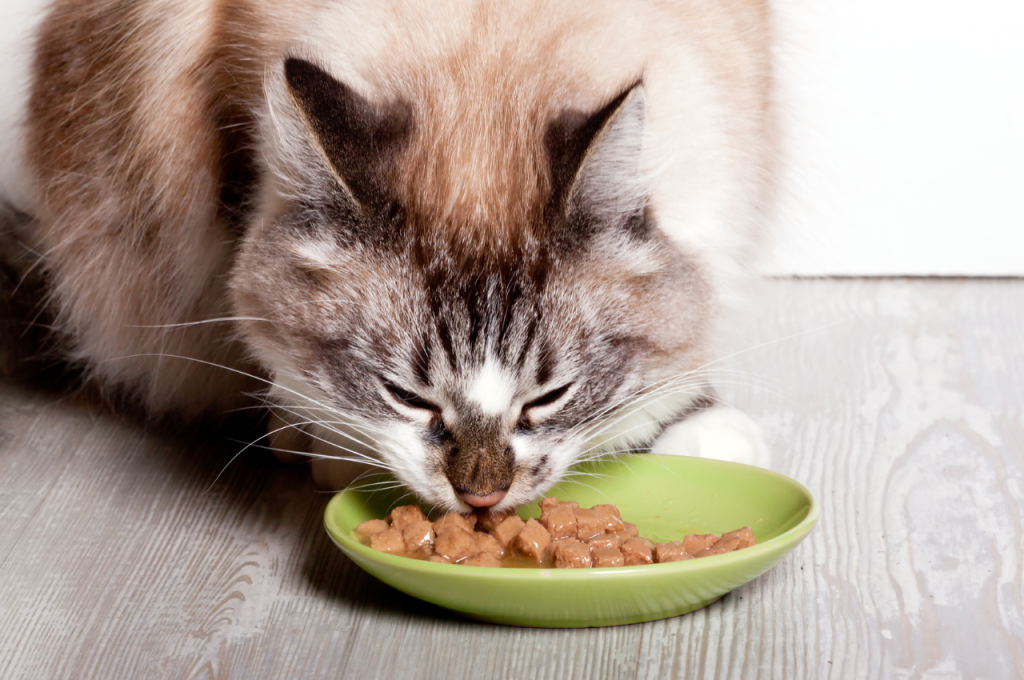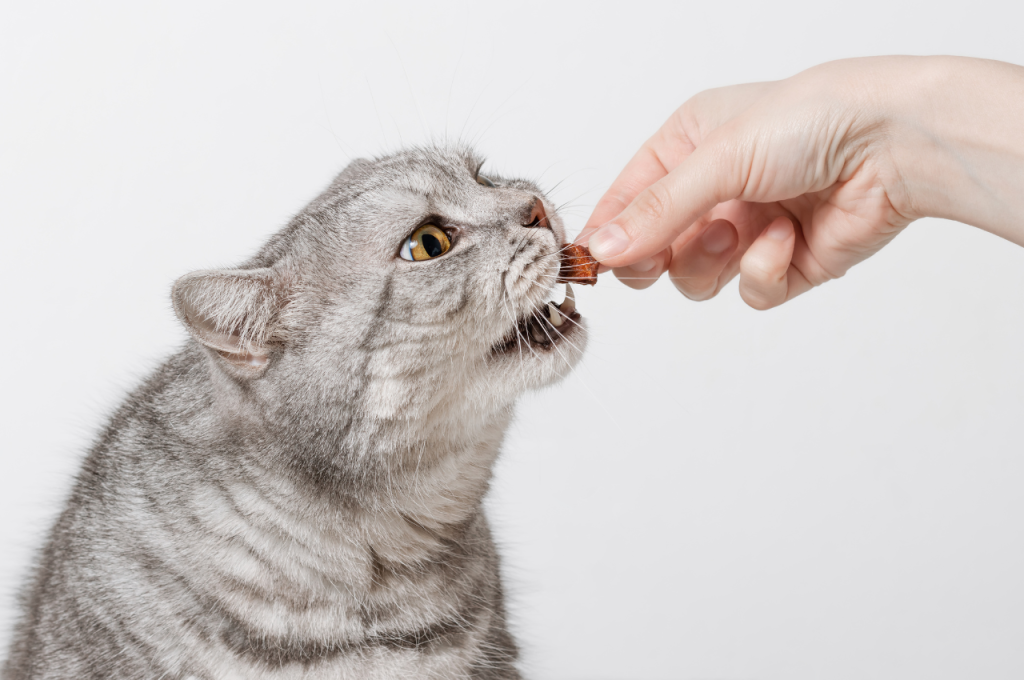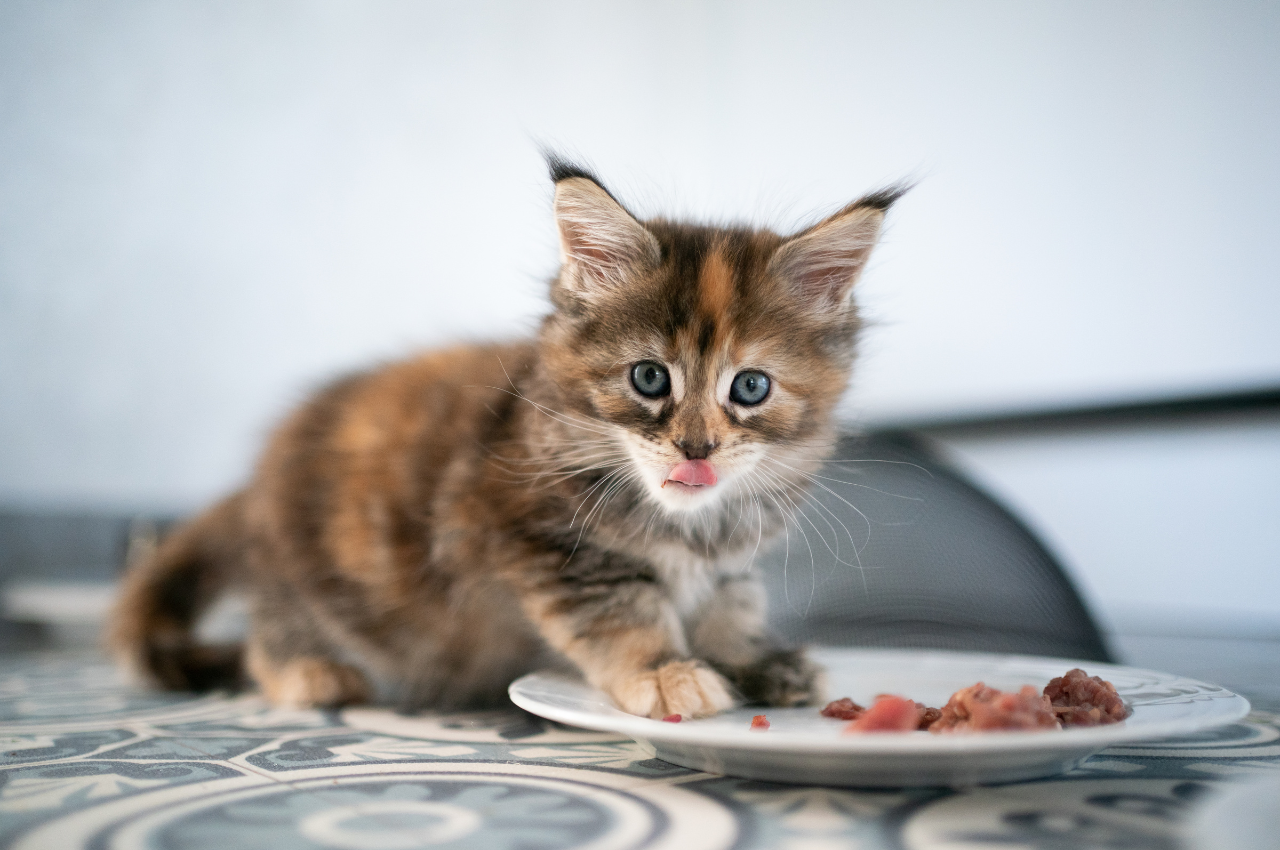Cats eat a diet primarily consisting of meat, with a mix of carbohydrates and essential nutrients. Their diet should also include water for hydration.
Cats are obligate carnivores, meaning they rely on animal protein for optimal health. Their diet should be high in protein with moderate fat content and minimal carbohydrates. Commercial cat food typically provides a balanced mix of these nutrients. It is important to feed cats a diet that meets their specific nutritional requirements to keep them healthy and active.
In addition to commercial cat food, you can also offer occasional treats like cooked eggs or lean meats. Monitoring your cat’s food intake and weight is essential to ensure they maintain a healthy diet and lifestyle.
The Importance of Feline Nutrition
Feline nutrition is crucial for a cat’s overall health and well-being. Their diet should consist mainly of protein from sources like meat, as well as essential vitamins and minerals. Quality food tailored to a cat’s specific dietary needs is essential for maintaining their health and happiness.

Understanding A Cat’s Dietary Needs
Cats require a diet rich in protein, amino acids, fatty acids, and vitamins. They are obligate carnivores, meaning their nutritional needs are primarily met through animal-based proteins.
The Role of Proper Nutrition in Cat Health
Proper nutrition is vital for cats as it supports immune function, organ health, weight management, and overall well-being. Inadequate nutrition can lead to nutrient deficiencies, obesity, and various health issues. A balanced diet promotes a cat’s longevity and quality of life.
Essential Nutrients for Cats
Cats, just like humans, require a balanced diet to thrive. Understanding the essential nutrients for cats is crucial for ensuring their health and well-being.
Protein: The Foundation of A Cat’s Diet
Cats are obligate carnivores, meaning protein is vital for their overall health and well-being. It supports muscle growth and repair, essential for their active lifestyle.
Carbohydrates: Should Cats Consume Them?
While cats do not require carbohydrates as a primary energy source, a small amount in their diet can provide fiber and aid in digestion.
Fats: The Benefits and Risks for Cats
Fats are a concentrated source of energy and essential fatty acids that support a cat’s skin, coat, and overall health. However, too much fat can lead to obesity.
Vitamins and Minerals: Critical Nutrients for Cats
A diet rich in essential vitamins and minerals is necessary to support various bodily functions, from immune system health to bone strength in cats.
Choosing The Right Cat Food
Choosing the right cat food is essential to ensure the overall health and well-being of your feline friend. With so many options available in the market, it can be overwhelming to determine which cat food is best for your pet.
In this section, we will discuss some important factors to consider when selecting cat food, including how to read cat food labels, understanding the importance of AAFCO certification, and the pros and cons of dry versus wet food. We will also touch upon considerations for homemade cat diets.
Reading Cat Food Labels: What to Look For
When it comes to choosing cat food, reading the labels is crucial. Cat food labels provide valuable information about the ingredients and nutrient composition of the product. By understanding what to look for on the labels, you can make informed decisions about the quality of the cat food you are purchasing.
Here are some key things to look for when reading cat food labels:
- Ingredient List: The ingredient list should be transparent and easy to understand. Look for high-quality protein sources, such as chicken or fish, listed as the main ingredient. Avoid cat foods that contain too many fillers or artificial additives.
- Nutritional Adequacy Statement: This statement indicates whether the cat food is formulated to meet the minimum nutritional requirements established by the Association of American Feed Control Officials (AAFCO). Ensure that the food is suitable for your cat’s specific life stage, such as “kitten,” “adult,” or “senior.”
- Guaranteed Analysis: This section provides information about the levels of key nutrients, such as protein, fat, and fiber, present in cat food. It allows you to compare different brands and choose the one that meets your cat’s dietary needs.
Understanding The Importance of Aafco Certification
AAFCO certification is an essential factor to consider when choosing cat food. AAFCO sets nutritional standards for pet food and ensures that the food is formulated to meet the needs of cats at different life stages. Look for a statement on the cat food packaging that indicates that it meets AAFCO nutrient profiles or has undergone AAFCO feeding trials. This certification ensures that the cat food provides complete and balanced nutrition for your furry friend.
Dry vs. Wet Food: Pros and Cons
The debate between dry and wet cat food is a common one among cat owners. Both types have their advantages and disadvantages, and it’s important to choose the one that suits your cat’s individual needs.
Here are some pros and cons of dry and wet cat food:
| Dry Food (Kibble) | Wet Food (Canned) |
| Convenient and easy to store | Higher moisture content, promoting hydration |
| Promotes dental health by reducing tartar buildup | More palatable and appealing to picky eaters |
| Maintains freshness for a longer period | Less likely to contain artificial preservatives |
Considerations for Homemade Cat Diets
Some cat owners prefer to prepare homemade diets for their feline companions. While homemade cat diets can offer certain benefits, it is crucial to ensure that they meet all of your cat’s nutritional needs.

Consider these factors before opting for a homemade cat diet:
- Nutritional Balance: Homemade cat diets should be carefully formulated to provide the right balance of proteins, fats, carbohydrates, vitamins, and minerals. Consulting a veterinarian or a feline nutritionist is recommended to prevent nutritional deficiencies.
- Ingredient Quality: Use high-quality and fresh ingredients to ensure the best nutritional value for your cat.
- Cooking Methods: Some nutrients can be lost during the cooking process. Understanding how different cooking methods affect nutrient retention is crucial.
- Supplementation: Homemade cat diets may require supplementation to meet certain nutrient requirements. Discussing this aspect with a professional is essential.
By considering these factors, you can make an informed decision about whether a homemade cat diet is the right choice for your feline companion.
Common Diet Mistakes to Avoid
When it comes to ensuring the health and well-being of our feline companions, understanding their dietary requirements is crucial. Avoiding common diet mistakes can significantly contribute to keeping your cat healthy and happy. Let’s explore some common diet mistakes to avoid when determining what your cat should eat.
Feeding an Exclusively Plant-based Diet
An exclusively plant-based diet may seem like a healthy option, but it’s important to remember that cats are obligate carnivores. Their bodies have evolved to require nutrients found in animal flesh. Feeding them a diet solely composed of plant-based foods can lead to severe nutritional deficiencies and health issues.
Overfeeding or Underfeeding: Finding The Right Balance
Finding the right balance in your cat’s diet is crucial. Overfeeding can lead to obesity, which is a common health issue among cats. On the other hand, underfeeding can result in malnutrition and various health problems. It’s essential to follow feeding guidelines provided by your veterinarian to ensure your cat receives the appropriate amount of food.
Giving Cats Table Scraps: What You Need to Know
It’s important to resist the urge to give your cat table scraps, no matter how endearing those pleading eyes may be. Human food, especially in excessive amounts, can be harmful to cats. Some human foods, such as chocolate and onions, can be toxic to cats, while others can upset their digestive system. Stick to a well-balanced, nutritionally complete cat food instead.
Neglecting to Provide Fresh Water
Cats need access to fresh water at all times. Neglecting to provide an adequate supply of water can lead to dehydration, urinary tract issues, and other health complications. Ensure that your cat always has access to clean, fresh water in a suitable and easily accessible bowl.
Special Dietary Needs for Cats
Cats have unique dietary needs that require special attention and care. Understanding these needs is essential for ensuring the health and well-being of our feline friends. Let’s take a closer look at the special dietary requirements for cats and how to cater to specific needs.
Managing Food Allergies and Sensitivities
Food allergies and sensitivities are not uncommon in cats and can lead to a range of health issues. It’s important to be mindful of your cat’s dietary sensitivities and carefully monitor their reactions to different foods. An elimination diet can help identify specific allergens, and with the guidance of a veterinarian, you can introduce hypoallergenic diets to address these issues.
Dealing with Weight Issues: Obesity and Weight Loss Diets
Cats, like humans, can struggle with obesity and weight-related health problems. To address this, monitor portion sizes and choose low-calorie, high-protein diets. Incorporating regular exercise and providing interactive toys can also help in managing and preventing obesity in cats.
Catering to Cats with Medical Conditions
Cats with medical conditions have specific dietary requirements that must be carefully managed. For example, diabetic cats may require specialized diets to regulate blood sugar levels, while cats with kidney disease may benefit from low-phosphorus diets. Always consult with a veterinarian to ensure that your cat’s diet is tailored to their specific medical needs.
Transitioning Your Cat to A New Diet
When it comes to ensuring your cat’s health and well-being, providing them with a nutritious diet is essential. However, switching your feline friend to a new diet can be a challenging task. Cats are known for their discerning tastes, and abruptly changing their food can lead to digestive issues and refusal to eat. To help your cat successfully transition to a new diet, follow the tips and strategies outlined below, to ensure your furry companion’s health and happiness.
The Importance of Gradual Dietary Changes
Cats are creatures of habit, and sudden changes in their diet can upset their delicate digestive system. To ensure a smooth transition, it is crucial to make dietary changes gradually. This not only allows your cat’s taste buds and digestive system to adjust but also prevents any potential stomach upset.
Your cat’s current diet serves as the foundation for introducing the new food. Begin by gradually mixing small amounts of the new food with their existing diet, increasing the proportion of the new food over time. This method will help your cat become accustomed to the new flavors and textures without causing any gastrointestinal distress.
Introducing New Foods: Tips and Tricks
Introducing new foods to your cat’s diet can be a delicate process. Here are some tips and tricks to ease the transition:
- Start by offering small amounts of the new food alongside their regular diet.
- Observe your cat’s reactions and appetite. If they show interest and eat the new food, gradually increase the quantity.
- Experiment with different textures and flavors to find what appeals to your cat’s palate.
- Consider warming the new food slightly. Cats are often attracted to the aroma of warm food.
Dealing With Picky Eaters: Strategies and Solutions
Some cats can be quite picky when it comes to their food. To encourage them to try new foods, consider the following strategies and solutions:
- Offer a variety of food options to keep things interesting and cater to your cat’s preferences.
- Try different feeding techniques, such as using puzzle feeders or interactive toys, to engage your cat’s natural hunting instincts.
- If your cat refuses to eat the new food, don’t give up. Gradually mix small amounts of the new food with their preferred food and gradually increase the proportion over time.
Remember that every cat is unique, and it may take some time to find the right food and feeding routine that suits their needs. Patience and persistence are key when transitioning your cat to a new diet.
Supplementing Your Cat’s Diet
Cats require a balanced diet for optimal health, but sometimes, supplementing their diet can provide additional benefits.
When to Consider Nutritional Supplements
Consider adding nutritional supplements to your cat’s diet if they have specific health concerns or special dietary needs.
Common Supplements for Cat Health
- Fish oil: Rich in omega-3 fatty acids for a healthy coat and skin.
- Probiotics: Supports digestive health and immune system.
- Joint supplements: Helps maintain mobility and joint health in older cats.
Consulting With A Veterinarian Before Supplementation
Always consult with a veterinarian before adding any supplements to your cat’s diet to ensure proper dosage and benefits.
Additional Tips for Feline Nutrition
The impact of neutering or spaying on diet. Cats have specific dietary needs based on their age. Kittens require more protein and fat for growth. Adult cats need a balanced mix of nutrients. Elderly cats may benefit from more easily digestible foods. Neutering or spaying can impact a cat’s metabolism. Cats may gain weight post-neutering, so adjust their diet accordingly.

Consult with a vet to determine the appropriate food portions. Regularly observe your cat’s eating patterns and weight. Sudden changes could indicate health issues or dietary concerns. Keep track of the amount and types of food consumed daily. Adjust portion sizes based on your cat’s activity levels and weight.
Conclusion
To sum up, understanding what cats eat is essential for their overall health and well-being. By providing them with a balanced diet that includes the right proportion of proteins, fats, and carbohydrates, we can ensure they receive all the necessary nutrients.
Remember to consult your veterinarian for personalized dietary recommendations and avoid feeding them toxic or harmful foods. With proper nutrition, your feline friend can enjoy a long and happy life.
